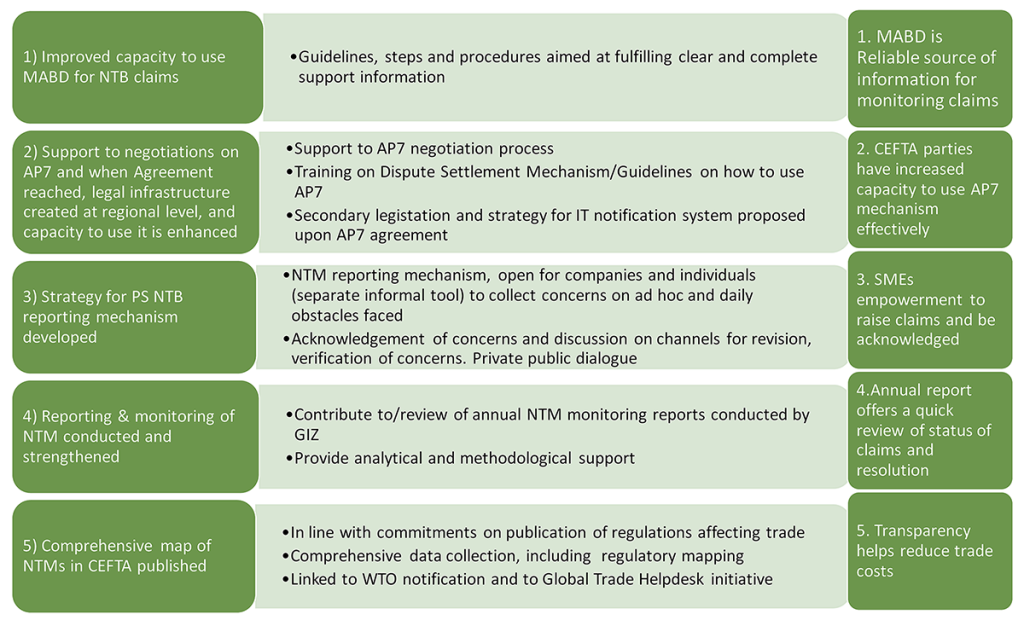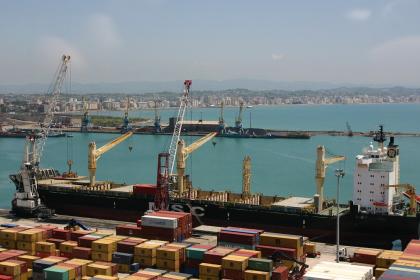The Central European Free Trade Agreement (CEFTA) region is experiencing persistent complaints about trade barriers within the region, and there has been no satisfactory way so far to address them. Economic growth is affected, and integration becomes more difficult. Businesses cannot develop to fully exploit economies of scale and deepen regional value chains. A mechanism for dispute settlement exists but has not proved to be functional. In 2020, the Parties engaged in negotiations to modernize the Dispute Settlement Mechanism (DSM).
Within this project, UNCTAD supports the negotiations on DSM and will support the implementation of the DSM once the Additional Protocol 7 (AP7) on DSM is agreed.
UNCTAD will assist in efforts to prevent and eliminate trade obstacles encountered in regional trade in CEFTA, also by strengthening non-tariff measures (NTM) claims resolution through the CEFTA Market Access Barriers Database (MABD).
UNCTAD will develop Guidelines, steps and procedures aimed at fulfilling clear and complete support information. The private-public dialogue will be enhanced by developing a strategy for monitoring and reporting mechanism on NTMs by the private sector.
Objective
The objective is to strengthen economic integration and development within CEFTA Parties through increased intra-CEFTA trade and business linkages and bringing the region closer to EU markets.
The specific objective is to improve the functioning of non-tariff barrier resolution mechanisms and prevention of trade barriers and obstacles.
Intended results and outcomes
-
Improved capacity to use Market Access Barriers Database (MABD) for NTM claims
Activities will strengthen the functioning of MABD with a view of making this database an effective tool to resolve claims on NTMs. UNCTAD will develop/update Guidelines by defining steps and procedures aimed at fulfilling clear and complete support information in every claim set in the database. The MABD IT design may undergo adjustments as necessary.
UNCTAD will provide capacity building for CEFTA Parties and CEFTA Secretariat. The participation of women will be actively pursued.
-
Support to the AP7 Negotiations and enhanced capacity of the Parties to use AP7 DSM
The activities under this result aim to ensure that CEFTA Parties can use the AP7 mechanism effectively when necessary. As AP7 negotiations are still ongoing UNCTAD provides legal and organizational support to the negotiation process.
This result covers 2 broad areas of activities: technical support including support in development of the necessary secondary legislation that are necessary to define important aspects in usage process once the Agreement on AP7 is signed, and capacity building.
-
Strategy for Private Sector mechanism for reporting trade barriers
The Private Sector Strategy for reporting trade barriers will set out a pathway for a mechanism that will provide a channel for the private sector, particularly small and medium enterprises (SMEs), to raise concerns about perceived trade barriers. The result contributes to one element of a comprehensive trade barrier resolution approach and aims to strengthen SMEs participating in intra-CEFTA trade.
The activities in this area will develop a vision, strategy and implementation guidelines, to establish an online tool for reporting perceived trade barriers.
-
NTMs Reports
Assist CEFTA Secretariat in producing quantitative and qualitative monitoring reports to the CEFTA Joint Committee on resolved, not resolved or standing claims related to NTM.
GIZ has been preparing the NTM reports annually. UNCTAD will coordinate and collaborate with GIZ and provide inputs such as the NTM data map (Result 5) if available in time, to build upon the work done and the methodologies developed, and profit from the synergies. UNCTAD will also contribute to the reports by providing feedback, suggestions for analysis and joining discussions with the partners and other reviewers.
-
Comprehensive regulatory mapping of NTMs in CEFTA
The NTMs data collection is a comprehensive mapping that registers in a systematic database all regulations that affect imports and exports, both at the border and behind the border measures. It includes all SPS and TBT measures that are in force through official legislation, laws and secondary regulations. Only publicly available official regulations are coded. It allows to identify all trade requirements for every single product at the HS 6-digit level.
The methodology has been developed by UNCTAD with partners including the EC DG Trade, WTO, OECD and others, and became the International Classification, i.e., a global common language for NTMs. Data is available for more than 100 economies around the world at https://trainsonline.unctad.org/home .
The NTM data collection will be implemented for each CEFTA Party and it will promote transparency in trade regulatory area.
Link to the SDGs
Direct:
- Target 17.10: Promote a universal, rules-based, open, non-discriminatory and equitable multilateral trading system under the World Trade Organization, including through the conclusion of negotiations under its Doha Development Agenda
- Target 17.11: Significantly increase the exports of developing countries, in particular with a view to doubling the least developed countries’ share of global exports by 2020
Indirect:
- Target 16.3: Promote the rule of law at the national and international levels and ensure equal access to justice for all
- Target 16.6: Develop effective, accountable and transparent institutions at all level; Reduce inequality through helping MSME
- Target 10.3: Ensure equal opportunity and reduce inequalities of outcome, including by eliminating discriminatory laws, policies and practices and promoting appropriate legislation, policies and action in this regard
- Target 10.4: Adopt policies, especially fiscal, wage and social protection policies, and progressively achieve greater equality



